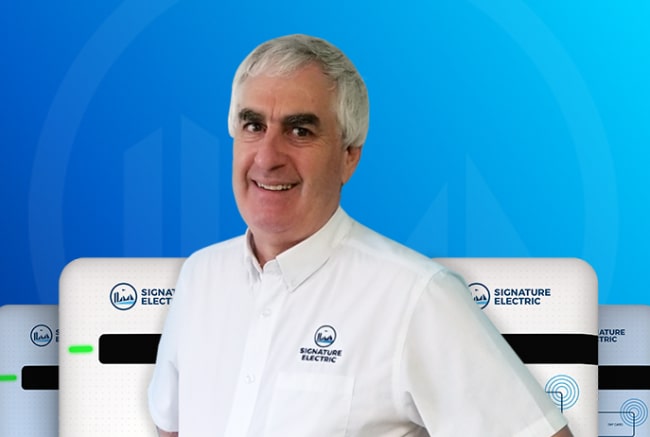Mark Marmer, President of Signature Electric and member of the Electrical Contractors Association of Ontario.
Planning Key for Electric Car Charging Stations

By Sherri Haigh
Electrical contractors help to ensure installation safe and effective.
On some days, Mark Marmer’s job is a combination of detective and problem solver.
“So what’s involved to be able to install EV chargers? Just a thing with two wires, and you hook it up, right? Unfortunately, it is definitely not that simple,” says Marmer, President of Signature Electric and member of the Electrical Contractors Association of Ontario.
As more Ontarians transition to electric cars, high-rise residential and business properties are going to need electric charging stations, and they are going to need expert advice to ensure their investment is managed correctly and safely.
“Each different place needs a different approach. A workplace is putting in chargers to perhaps accommodate employees. A mall might be trying to increase the dwell time and have people stay longer. Eventually, if you haven’t planned it out well, you’re going to run into problems,” says Marmer.
It’s a recommendation echoed by Cara Clairman, Founder and CEO of Plug’n Drive, a non-profit organization and trusted source for information in the electric vehicle industry.
“When dealing with multi-unit residential or workplace, a licensed electrical contractor who’s got experience with EVs will have advice to offer in terms of how many chargers at what location, and power management options to reduce electrical capacity needs, an experienced person is going to have the knowledge to help the customer really get the best solution out there,” says Clairman.
The installation of EV infrastructure in, for example, a multi-use residential building can be a very complex process that will require working with property managers, condo residents as well as the electrical contractor.
Plug’n Drive has created a guide for condo owners, boards and managers to help. While the guide stresses the importance of hiring a licensed electrical contractor who has experience with electric car charger installation, the guide also highlights the important considerations and steps for the entire process.
While at times it can be a complex task, the benefit of bringing in experts at the beginning of the process is they can help make it a lot easier.
“Bring us just the nugget of what you need to begin with, and we will figure the rest of it out. Electrical contractors are in a perfect position to be able to help move this forward,” Marmer adds.
Marmer says he has worked in a variety of locations, and each brings new challenges and can require creativity.
“It could be workplaces, it could be shopping malls, it can be schools, it can be cities – not just the level two, but even the level three chargers, we do a lot for auto manufacturers, so all kinds of interesting places,” says Marmer.
Given the growing interest in electric vehicles and federal funding grants available, the demand for EVs is going to only increase. Which means even homebuyers who are looking for an electric charger should be using an expert.
“I would definitely go with a licensed contractor. I just think it makes sense to go with somebody who knows what they’re doing because there’s a fire risk if you don’t, and also an Electrical Safety Authority (ESA) approval required,” said Clairman.
“It’s like the equivalent of hooking up a stove but keeping the stove on six hours a day inside your house. Does this really seem like a do-it-yourself thing? I think not,” says Marmer.
To find a licensed electrical contractor in your region, visit ecao.org.
Consumers can find a list of ECAO contractors who have electricians who are certified EVITP installers at netco.org/evitp-installers.
This article was also published in Canadian Architect and Building Magazine.